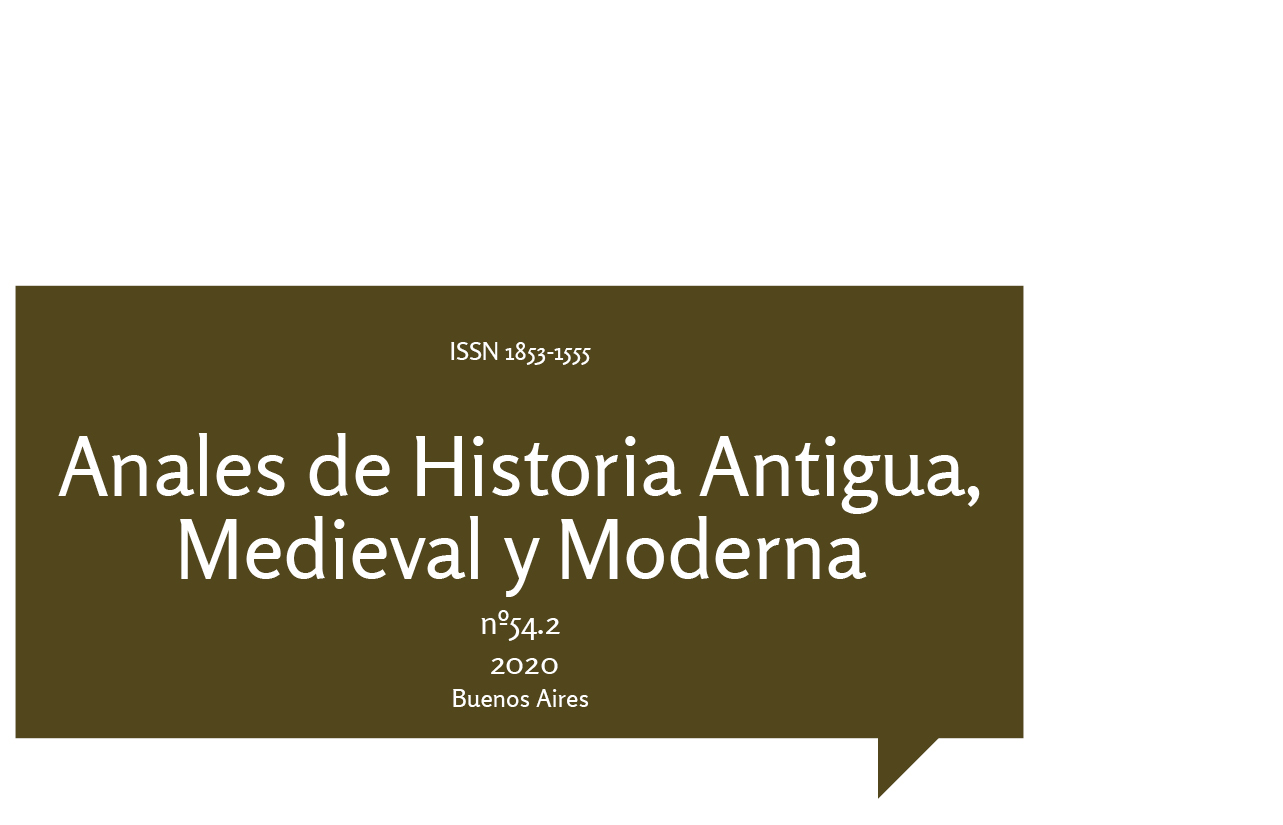As vantagens da História Cruzada para o estudo da História de Esparta no período clássico
Resumen
La relación política de las poleis de la Hellas siempre ha sido inevitable frente al mar Mediterráneo, visto como un espacio relacional de dimensiones especificas y limitadas. En vista de esto, nuestro objetivo es analizar las relaciones políticas del navarco espartiata Lisandro en la Hellas del período clásico a través del marco teórico del análisis del discurso francés y la teoria de redes, así como por la perspectiva comparativa de la Histoire Croisée. En este sentido, proponemos que una investigación dotada de evidencia de múltiples temporalidades y espacialidades nos puede proporcionar mecanismos académicos para superar la tendencia atenocéntrica de la historiografía que consideraba a Lisandro y al basileus Agesilau II como los únicos responsables de la desestructuración de Esparta.Descargas
Citas
Assumpção, L. F. B. de. (2019). A representação da mḗtis do esparciata Lisandro na Batalha de Egospótamo (405 a.C.). Romanitas. Revista de Estudos Grecolatinos, 13, 127-142.
Beck, H. (2008). Prologue. En J. Buckler y H. Beck (Eds.), Central Greece and the Politics of Power in the Fourth Century B.C. (1-30). Cambridge: Cambridge University Press.
Beck, H. y Funke, P. (2015). An introduction to federalism in Greek antiquity. En H. Beck y P. Funke (Eds.), Federalism in Greek Antiquity (1-29). Cambridge: Cambridge University Press.
Buckler, J. (2003). Aegean Greece in the Fourth Century B.C. Leiden: Brill.
Canfora, L. (2016). Tucidide: la menzogna, la colpa, l’esilio. Bari: Editori Laterza.
Cartledge, P. (1987). Agesilaos and the Crisis of Sparta. Baltimore: The Johns Hopkins University Press.
Cartledge, P. (2003). The Spartans: An Epic History. Londres: Pan Books.
Christien, J. y Ruzé, F. (2007). Sparte: Géographie, mythes et histoire. Paris: Armand Colin.
David, E. (1981). Sparta between Empire and Revolution (404-243 B.C.): Internal Problems and Their Impact on Contemporary Greek Consciousness. Nova Iorque: Arno Press.
De Certeau, M. (2008). A Escrita da História. Rio de Janeiro: Forense-Universitária.
DeVoto, J. (1982). Agesilaos II and the Politics of Sparta, 404-377 B.C. Chicago: Loyola University of Chicago (Tese).
Finley, M. (1981). Economy and Society in Ancient Greece. Nova Iorque: The Viking Press.
Fornis, C. (2016). Esparta: La historia, el cosmos y la leyenda de los antiguos espartanos. Sevilla: Editorial Universidad de Sevilla.
Fornis, C. (2018). El poco espartano patronazgo de Agesilao. En J. Pascual, B. Antela-Bernárdez y D. Castro (Eds.), Cambio y pervivencia. El mundo griego en el siglo IV a.C. (125-139). Madrid: Ediciones Universidad Autónoma de Madrid.
Funke, P. (2009). Between Mantinea and Leuctra. En P. Fnke y N. Luraghi (Eds.), The Politics of Ethnicity and the Crisis of the Peloponnesian League (1-14), Cambridge: Harvard University Press.
Hamilton, C. (1979). Sparta’s Bitter Victories: Politics and Diplomacy in the Corinthian War. Ithaca: Cornell University Press.
Hamilton, C. (1991). Agesilaus and the Failure of Spartan Hegemony. Ithaca: Cornell University Press.
Hanson, V.D. (2012). Uma Guerra sem igual: como atenienses e espartanos lutaram na Guerra do Peloponeso. Rio de Janeiro: Record.
Herman, G. (1987). Ritualised Friendship and the Greek City. Cambridge: Cambridge University Press.
Hodkinson, S. (2000). Property and Wealth in Classical Sparta. Swansea: The Classical Press of Wales.
Kadushin, C. (2012). Understanding Social Networks: theories, concepts, and findings. Oxford: Oxford University Press.
Kagan, D. (1969). The Outbreak of the Peloponnesian War. Ithaca: Cornell University Press.
Kagan, D. (1974). The Archidamian War. Ithaca: Cornell University Press.
Kagan, D. (1981). The Peace of Nicias and The Sicilian Expedition. Ithaca: Cornell University Press.
Kagan, D. (1987). The Fall of the Athenian Empire. Ithaca: Cornell University Press.
Konstan, D. (2005). A amizade no mundo clássico. São Paulo: Odysseus Editora.
Lemercier, C. (2015). Formal Network Methods in History: Why and How?. En G. Fertig (Ed.), Social Networks, Political Institutions, and Rural Societies (281-310). Turnhout: Brepols.
Low, P. (2007). Interstate Relations in Classical Greece: Morality and Power. Cambridge: Cambridge University Press.
Maingueneau, D. (1997). Novas Tendências em Análise do Discurso. Campinas: Editora da UNICAMP.
Malkin, I. (2011). A Small Greek World: Networks in the Ancient Mediterranean. Oxford: Oxford University Press.
Mossé, C. (1968). Les institutions politiques grecques à l’époque Classique. Paris: Armand Colin.
Pires, F. M. (2006). Mithistória (Vol. II). São Paulo: Humanitas.
Powell, A. (2001). Athens and Sparta: Constructing Greek Political and Social History, from 478 BC. Londres: Routledge.
Powell, A. (2010). Divination, Royalty and Insecurity, En A. Powell y S. Hodkinson (Eds.), Sparta: The Body Politic (85-136). Swansea: The Classical Press of Wales.
Raaflaub, K. (2006). Thucydides on Democracy and Oligarchy. En A. Rengakos y A. Tsakmakis (Eds.), Brill’s Companion to Thucydides (189-223). Leiden: Brill.
Rusch, S. M. (2011). Sparta at War: Strategy, Tactics, and Campaigns, 550-362 BC. Londres: Frontline Books.
Starr. C. G. (1965). The Credibility of Early Spartan History. Historia, 14, 257-272.
Ste. Croix, G. E. M. (1972). Spartan Foreign Policy, and the Peloponnesian League. En G. E. M. Ste. Croix (Ed.), The Origins of the Peloponnesian War (89-166). Londres: Duckworth.
Taylor, M. (2010). Thucydides, Pericles, and the Idea of Athens in the Peloponnesian War. Cambridge: Cambridge University Press.
Tritle, L. (1997). Introduction. En L. Tritle (Ed.), The Greek World in the Fourth Century: From the Fall of the Athenian Empire to the Successors of Alexander (1-7). Londres: Routledge.
Vlassopoulos, K. (2009). Beyond and Below the Polis: Networks, Associations, and the Writing of Greek History. En L. Malkin, C. Constantakopolou y K. Panagopoulou (Eds.), Greek and Roman Networks in the Mediterranean (12-23). Londres: Routledge.
Werner, M. y Zimmermann, B. (2003). Pensar a história cruzada: entre empiria e reflexividade. Textos de História, 11(1/2), 89-127.
Westlake, H. D. (1971). Thucydides and the Uneasy Peace. A Study in Political Incompetence. The Classical Quarterly, 21(2), 315-325.
Derechos de autor 2020 Anales de Historia Antigua, Medieval y Moderna

Esta obra está bajo licencia internacional Creative Commons Reconocimiento-CompartirIgual 4.0.








